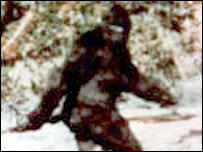In search of Bigfoot

By Megan Lane BBC News Magazine
Even the scientists who are DNA testing hair found in a suspected Bigfoot print say they expect the results to come back as bear or bison. Why is the myth of this huge ape-like beast so powerful for many cultures?
Bigfoot n. - large, hairy, humanoid creature said to wander the wooded wilds of the Pacific Northwest. Also known as Sasquatch (Canada), the Yeti or Abominable Snowman (Asia), Mapinguari (the Amazon) and Yowie (Australia).
In the Himalayas there's an old Sherpa saying that, "There is a Yeti in the back of everyone's mind; only the blessed are not haunted by it."
Many cultures have legends about solitary man-beasts, and recorded sightings in North America and Asia date back to the early 1800s. Despite numerous sightings, photos and footprints of often questionable origin, there has never been conclusive proof that these creatures exist. No droppings, no bones, no hair and no bodies found - alive or dead.
BIGFOOT BASICS
- Earliest report by a white man was prints found by a Canadian trader in 1811
- Name dates from 1958 media reports of giant prints found in California
- Ray Wallace, who died in 2002, claimed to have faked these
- Most famous footage shot in 1967 and contested ever since
And this week, geneticists at the University of Alberta are putting the legend to the test as they scrutinise hair alleged to have come from Bigfoot. The results are due on Thursday.
The tuft was collected by residents in Teslin, Yukon, who claim to have found it in a massive footprint left behind by a 3m-tall human-like creature which tromped through their backyards earlier this month.
Wildlife geneticist Dave Coltman expects that the hair will have come from a known mammal such as a bear or bison, but says he is curious enough to test this theory. "If Sasquatch is indeed a primate, then we would expect the sample to be closer to humans or chimpanzees or gorillas. That would be kind of cool, wouldn't it?"
Man-beast or myth
Regardless of his findings, the myth of Bigfoot does not need hard facts to persist.
The creatures are real enough to those who say they have spotted them, but opinion is divided on the nature of the beast. Some say it is flesh-and-blood; others, including various Native American tribes, believe it to be a spirit being which appears to humans in times of crisis.
Ralph Gray Wolf, an Athapaskan Indian from Alaska, has told reporters that Sasquatch makes appearances to help troubled communities "get more in tune with Mother Earth", bringing a message that there is a need to change.
Nor are such creatures confined to the vast, isolated tracts of land in North America and Asia - in the UK, such legends date back centuries.
Two years ago, investigators and the media descended on Bolam Lake, near Newcastle, following a spate of sightings of a tall, shadowy figure over the previous 18 months. In their week in the wooded, lakeside park, six of the party spotted the so-called Beast of Bolam.
Richard Freeman, of the Centre for Fortean Zoology centre, says one of his colleagues was among the witnesses.
"What they saw was not Bigfoot, or Sasquatch as I prefer to call him; it was an enormous shadowy figure in the trees, more like a ghost than flesh-and-blood. In a park not far from a city centre, you're not going to get a nine-foot ape-like creature - England just doesn't have the habitat to support it."
His theory is that sightings such as this - and Scotland's Big Grey Man of Ben MacDhui and the Grey King in Wales - are of a paranormal being.
"I don't mean that these are the ghosts of some creature which has died; I think it is more complex than that."
In his time as a professional monster hunter, Mr Freeman has travelled the world gathering tales of weird and wonderful creatures - and in every culture, the same types crop up time and again. He calls it the "international monster template", which is made up of dragons and other huge reptiles; large ape-like creatures, such as Sasquatch and the trolls of Medieval Europe; little people, such as fairies and goblins; giant birds; and phantom dogs and cats.
"I believe these are analogues of the creatures which inhabited the plains of Africa millions of years ago, which our ancestors would have had to deal with. We now have a fossil memory of these creatures. Under certain conditions, the human mind creates 3D images of these analogues."
Mind games
Sceptics such as Benjamin Radford, of the Skeptical Inquirer magazine, also believe that such sightings are our minds playing tricks on us. For it is actually very easy to fool ourselves into believing what we want to believe.
What often happens, he has said, is that out in the wilderness, in areas known Bigfoot or Yeti stomping grounds, someone will see something dark or hairy or fast out of the corner of their eye that startles them.
"If they're already thinking that there's a Bigfoot in the area, it's easy to make the leap between saying: 'I saw something, I don't know what it is,' to: 'I saw something and it's Bigfoot'," he has said.
As for the latest Bigfoot find, it will soon be known whether the hair is from a creature thus far unknown to science. And until then, the truth simply lies in the eye of the beholder.
Story from BBC NEWS:http://news.bbc.co.uk/go/pr/fr/-/1/hi/magazine/4720797.stm

0 Comments:
Post a Comment
<< Home